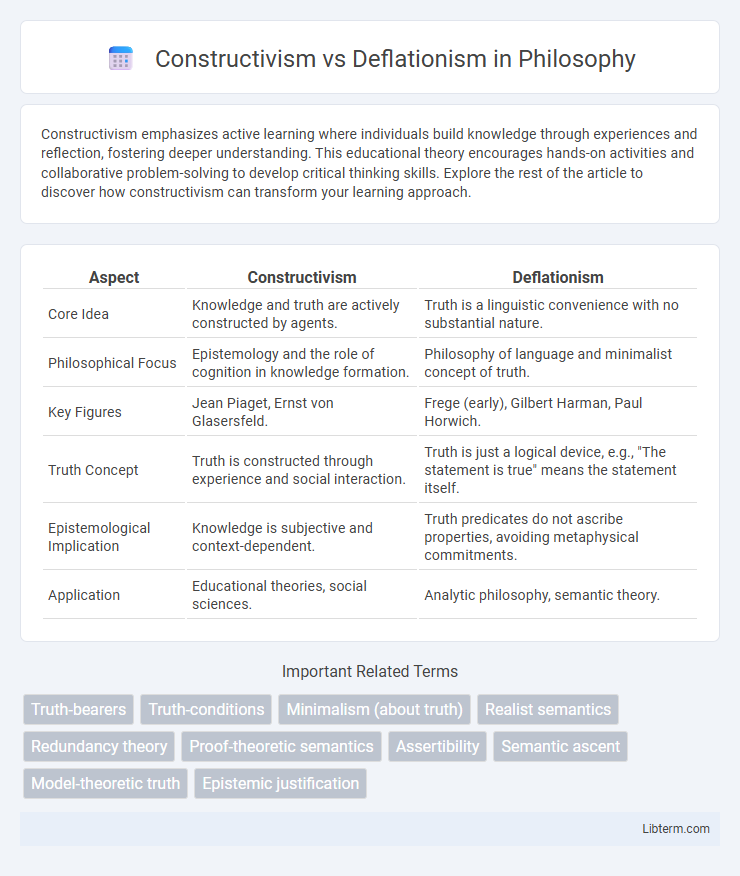Constructivism emphasizes active learning where individuals build knowledge through experiences and reflection, fostering deeper understanding. This educational theory encourages hands-on activities and collaborative problem-solving to develop critical thinking skills. Explore the rest of the article to discover how constructivism can transform your learning approach.
Table of Comparison
| Aspect | Constructivism | Deflationism |
|---|---|---|
| Core Idea | Knowledge and truth are actively constructed by agents. | Truth is a linguistic convenience with no substantial nature. |
| Philosophical Focus | Epistemology and the role of cognition in knowledge formation. | Philosophy of language and minimalist concept of truth. |
| Key Figures | Jean Piaget, Ernst von Glasersfeld. | Frege (early), Gilbert Harman, Paul Horwich. |
| Truth Concept | Truth is constructed through experience and social interaction. | Truth is just a logical device, e.g., "The statement is true" means the statement itself. |
| Epistemological Implication | Knowledge is subjective and context-dependent. | Truth predicates do not ascribe properties, avoiding metaphysical commitments. |
| Application | Educational theories, social sciences. | Analytic philosophy, semantic theory. |
Introduction to Constructivism and Deflationism
Constructivism posits that mathematical truths are not discovered but constructed by the human mind, emphasizing the role of mental processes and constructive proofs in establishing mathematical objects. Deflationism, by contrast, denies that truth is a substantial property, treating the truth predicate as a logical convenience without metaphysical commitment. This foundational debate influences the philosophy of mathematics by contrasting a constructive foundation against a minimalist, pragmatic view of truth.
Historical Origins and Key Proponents
Constructivism, rooted in early 20th-century philosophy, gained prominence through thinkers like Ernst Cassirer and Jean Piaget, emphasizing knowledge as actively constructed by cognitive processes. Deflationism, emerging in mid-20th-century analytic philosophy with key proponents such as Frank P. Ramsey and later Paul Horwich, challenges traditional truth theories by advocating that truth is a minimal or redundant concept. Both positions diverge significantly in their treatment of truth, with constructivism grounding it in epistemic frameworks, while deflationism reduces truth to a linguistic or logical device.
Core Principles of Constructivism
Constructivism centers on the idea that mathematical truths are not discovered but constructed through mental activities and constructive proofs, emphasizing the necessity of explicit constructions and avoiding non-constructive existence proofs. This philosophy rejects the law of excluded middle and classical logic principles, endorsing intuitionistic logic to validate mathematical statements. It contrasts with deflationism, which treats truth as a linguistic convenience rather than a robust property, while constructivism insists that truth depends on provability and constructive justification.
Core Principles of Deflationism
Deflationism centers on the idea that truth is not a substantial property but a linguistic convenience, asserting that the statement "It is true that p" merely affirms p itself. Core principles include the equivalence schema, which equates "'p' is true" with the proposition p, and the rejection of truth as a metaphysical or explanatory concept. This minimalist perspective contrasts with constructivism, which treats truth as dependent on constructive verification or proof.
Truth: Constructivist vs Deflationist Perspectives
Constructivist perspectives on truth emphasize that truth is a product of social processes, consensus, and justification within specific communities, meaning truth is constructed rather than discovered. Deflationist theories, by contrast, argue that truth is not a substantive property but merely a linguistic convenience, where asserting "truth" simply endorses a proposition without adding content. This fundamental disagreement highlights Constructivism's commitment to an interpretive framework and Deflationism's focus on the minimalist, non-metaphysical role of truth in language.
Language and Meaning in Both Theories
Constructivism posits that meaning in language emerges from cognitive structures and social conventions, emphasizing how speakers actively construct meaning through usage and context. Deflationism, by contrast, treats meaning as a minimal, non-substantive notion, often linked to truth-conditional aspects without substantial metaphysical commitments about language. The debate centers on whether linguistic meaning is richly constructed or fundamentally a byproduct of logical and semantic principles.
Philosophical Implications and Criticisms
Constructivism asserts that mathematical truths are mental constructions dependent on cognitive processes, challenging classical realism by denying the independent existence of mathematical objects. Deflationism minimizes the metaphysical significance of truth, treating it as a mere linguistic or logical convenience rather than a substantial property, which raises criticisms about its capacity to account for the normativity and objectivity of truth. Philosophical debates center on constructivism's reliance on human cognition risking subjectivity, while deflationism faces challenges explaining how truth can function effectively in discourse without substantive ontological commitments.
Application in Contemporary Debates
Constructivism emphasizes the role of social practices and agreements in shaping truth, influencing debates on ethical relativism and political legitimacy by asserting that norms are constructed rather than discovered. Deflationism challenges the substantiality of truth, treating it as a minimalist or redundant concept, which impacts discussions on the nature of truth in scientific realism and semantic theory. Contemporary applications reveal how constructivist frameworks support pluralistic approaches, while deflationist perspectives encourage a focus on linguistic and logical analysis over metaphysical commitments.
Comparative Analysis: Strengths and Weaknesses
Constructivism emphasizes the active role of agents in creating mathematical truths, offering flexibility and alignment with human cognition but faces criticism for potential subjectivity and lack of absolute certainty. Deflationism, by contrast, treats truth as a minimalist concept that avoids metaphysical commitments, ensuring simplicity and broad applicability while sometimes struggling to account for the explanatory power and normative force of truth. The comparative analysis reveals constructivism's strength in fostering constructive proofs and foundational clarity against deflationism's advantage in avoiding ontological complexity and maintaining conceptual economy.
Conclusion: Future Directions and Synthesis
Future directions in the debate between constructivism and deflationism involve integrating the subjective aspects of truth with minimalist truth theories to develop a more comprehensive understanding. Synthesizing these perspectives could enhance philosophical frameworks by balancing truth's pragmatic functions with its semantic simplicity. This approach encourages interdisciplinary research, bridging philosophy, linguistics, and cognitive science to refine truth theories.
Constructivism Infographic

 libterm.com
libterm.com